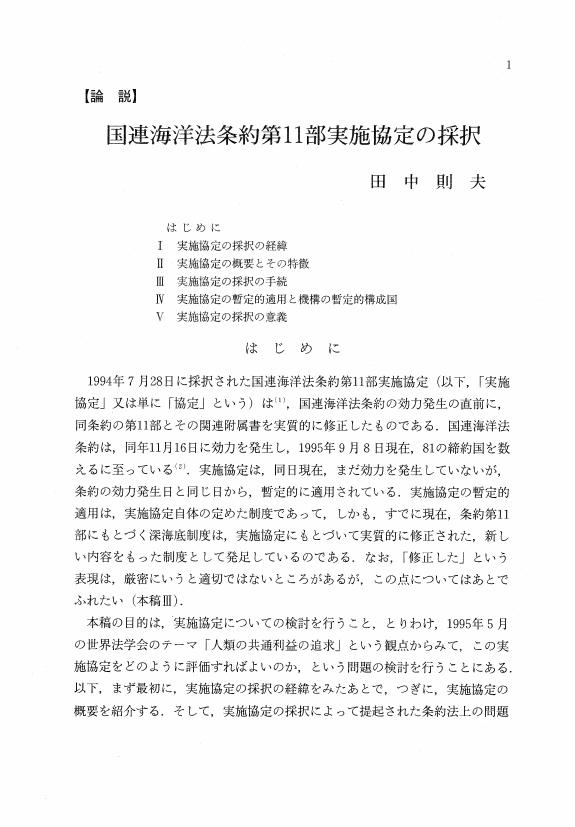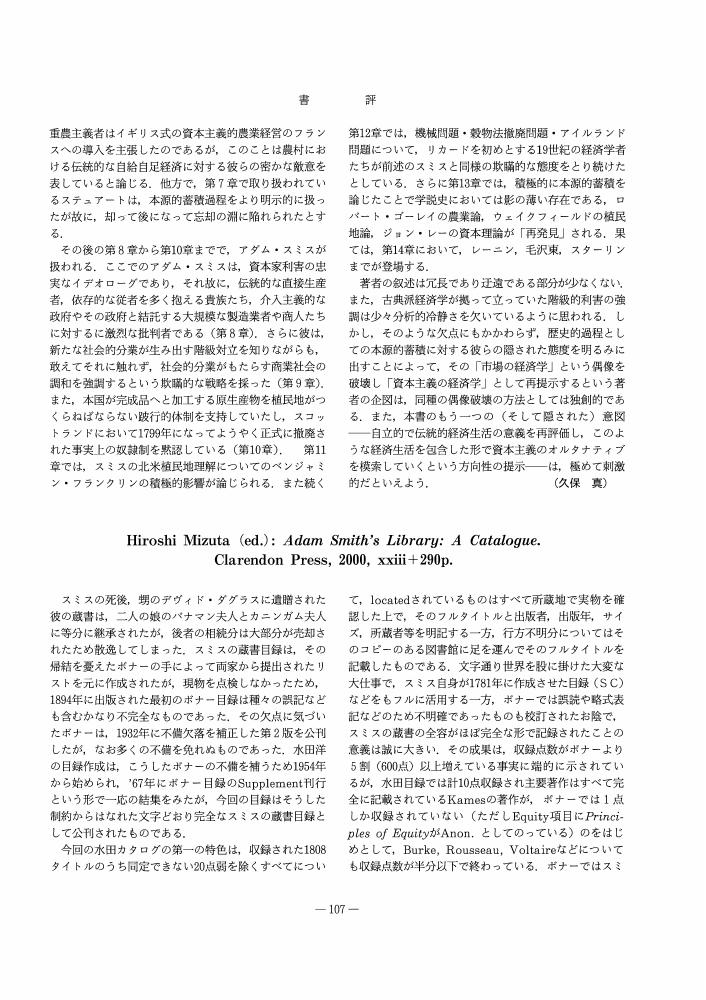1 0 0 0 OA 国連海洋法条約第11部実施協定の採択
- 著者
- 田中 則夫
- 出版者
- 世界法学会
- 雑誌
- 世界法年報 (ISSN:09170421)
- 巻号頁・発行日
- vol.1996, no.15, pp.1-29, 1996-03-20 (Released:2011-02-07)
- 参考文献数
- 19
- 著者
- 田中 秀臣
- 出版者
- 経済学史学会
- 雑誌
- 経済学史研究 (ISSN:18803164)
- 巻号頁・発行日
- vol.58, no.1, pp.177-178, 2016 (Released:2019-11-29)
1 0 0 0 OA 田中真晴編(1997)『自由主義経済思想の比較研究』名古屋大学出版会、序文
- 著者
- 田中 秀夫 Chapeskie Robert
- 出版者
- The Japanease Society for the History of Economic Thought
- 雑誌
- 経済学史研究 (ISSN:18803164)
- 巻号頁・発行日
- vol.58, no.1, pp.69-116, 2016 (Released:2019-08-31)
Introduction by Hideo Tanaka The late professor Masaharu Tanaka (1925-2000), president of JSHET from 1985-86, edited The Comparative Study of Liberal Economic Thought, a book published in 1997 by The University of Nagoya Press. He wrote a long preface to it, and this English article is a translation of that essay. During his two years as a junior researcher under Michio Morishima at Kyoto University, Tanaka began his studies with Max Weberʼs Wissenschafts-lehre before moving on to the study of 18th century French social thought and later Marx, Lenin and Prehanov. His Doctoral Dissertation was on the History of Russian Economic Thought, including the Narodniks, Marxists, and other movements. He became a professor of economic theory after its publication in 1967. With the decline of socialism, the focus of the economics academy in Ja-pan gradually shifted from Marxist political economy to Anglo-American eco-nomics. Tanaka and his study group (his former students and other scholars) start-ed the “society for the study of methodology of social sciences” in 1980, and continued to hold monthly meetings until his death. As mentor of this society, Tanaka read various books concerning liberalism and other topics. He found Hayekʼs work important, and translated several of his essays in collaboration with his student Hideo Tanaka, publishing them as Market, Knowledge, and Liberty in 1986, a book that became a forerunner of the “Hayek boom” in Japan.
1 0 0 0 OA アベノミクスをめぐる論争 日本は復活したか, それともまだ罠にはまったままか?
- 著者
- 田中 秀臣
- 出版者
- 経済学史学会
- 雑誌
- 経済学史研究 (ISSN:18803164)
- 巻号頁・発行日
- vol.57, no.2, pp.108-111, 2016 (Released:2019-08-30)
若田部昌澄『解剖アベノミクス』日本経済新聞出版社,2013 年 伊東光晴『アベノミクス批判―四本の矢を折る』岩波書店,2014 年 西部忠『貨幣という謎―金と日銀券とビットコイン』NHK 出版新書,2014 年 服部茂幸『アベノミクスの終焉』岩波新書,2014 年
- 著者
- 田中 秀夫
- 出版者
- 経済学史学会
- 雑誌
- 経済学史研究 (ISSN:18803164)
- 巻号頁・発行日
- vol.57, no.1, pp.98-99, 2015 (Released:2019-11-26)
1 0 0 0 OA OBITUARY Istvan Hont (1947-2013):
- 著者
- 田中 秀夫
- 出版者
- The Japanease Society for the History of Economic Thought
- 雑誌
- 経済学史研究 (ISSN:18803164)
- 巻号頁・発行日
- vol.56, no.1, pp.91-95, 2014 (Released:2019-08-24)
1 0 0 0 OA Tanaka Masaharu (1925-2000):
- 著者
- 田中 秀夫
- 出版者
- The Japanease Society for the History of Economic Thought
- 雑誌
- 経済学史研究 (ISSN:18803164)
- 巻号頁・発行日
- vol.55, no.2, pp.1-19, 2014 (Released:2019-08-23)
Tanaka Masaharu was born in Kyoto in 1925, and lived through the long Showa Era (1925-1989) to the Heisei Era (till 2000). He grew up in traditional Kyoto and studied there, leading an eventful and exciting life, both as a person and an academic. At Kyoto University, he studied economics and the history of ideas, and in his later graduate career, he concentrated on Max Weber, especially his Wissenschaftslehre, followed by the study of eighteenth-century Franceʼs Morelly and Mablyʼs socialist ideas. In 1959, Tanaka published a Japanese translation of a commentary by Max We-ber, Der Nationalstaat und die Volkswirtschaftspolitik (1895). While his interest in Marx, Lenin, and Weber deepened, he came to know Plehanov (1856-1918), the forefather of Russian Marxism, which motivated him to study Russian Marxism. His efforts resulted in the publication of A Study on the History of Russian Economic Thought in 1967, a work acclaimed as “epoch-making” among Japanese academia. This work earned him a Doctor of Economics, and he was promoted to professor in 1968. During his tenure, Tanaka endeavored to construct a more refined Marxian eco-nomic theory. Before resigning from Kyoto University, he founded a research circle known as “The Methodology Research Meeting” in 1973. He left the university for a teaching post, focusing on Marxian economic theory at Konan University. Here, Tan-aka started a reappraisal of the legacy of social thought in the West. He read Machia-velli, Hobbes, Hume, Smith, and J. S. Mill and lectured on them. He gained a new in-sight into Western liberalism as the result of translating Hayekʼs essays. Tanaka served as President of the Japanese Society for the History of Economic Thought (JSHET) from 1987 through 1989. At this time, Tanaka deepened his friendship with the highly respected historian of economics, Noboru Kobayashi. In 1998, Tanaka published an English article titled “The Logic of the Genesis of Mon-ey,” as the subject of money was one of long-held interest, though his early interest in Marx proved an enduring one as it appeared in the article. Earlier in 1985, Tanaka had published a review article, “The Academic World of Economics in early 1890s-Britain,” followed shortly by a number of others, including “A List of the writings of A. Marshall (1872-1889).” He could not, however, com-plete his study of Marshall, having planned to concretely elucidate the process of for-mation of Marshall Economics by applying the same historical method to Marshall that he had applied in his early study on Weber. He did edit and publish a substantial book during this period: A Comparative Study of Liberal Economic Thought (1997). He had intended to publish at least two more books, with The Issues of Max Weber published posthumously in 2001. Tanaka did, however, manage to edit a small book, A Memorial of a Historian of Economic Thought, before he passed away following a long sickness in 2000, at the age of 75. JEL classification numbers: B 14, B 19, B 31.
1 0 0 0 OA 市場・貧困・統治 18世紀末から1830年代のフランスにおける政治経済学
- 著者
- 田中 拓道
- 出版者
- 経済学史学会
- 雑誌
- 経済学史研究 (ISSN:18803164)
- 巻号頁・発行日
- vol.52, no.1, pp.20-34, 2010 (Released:2019-08-20)
The purpose of this article is to examine the changes in the role played by the government in the market according to the theories of the French political economy from the 1780s to the 1830s. These theories are generally regarded as the precursors of “economics.” This article reveals that these theories attempt to use the market politically aiming to develop the people’s “well-being” or “happiness,” and to redefine the government’s role in the market. At the beginning of nineteenth century, J. B. Say and C. Dunoyer emphasized the political significance of a free industrial market. According to them, it enables the people’s “moeurs” to be independent and self-disciplined, so as to establish a post-revolutionary political order. Some contemporary political economists such as J. Droz and M. T. Duchâtel doubted the compatibility between the accumulation of wealth and the development of “happiness” of the people. They asserted the need for elementary education as it leads to the redistribution of “new wealth.” Moreover, social economists from the 1830s, such as A. de Villeneuve- Bargemont and E. Buret, emphatically discussed the perverse effect of industrialization, stating that the concentration of capital inevitably caused the pauperization of most of the people. They believed that the new role of the government should be the “moralization” of the poor through the organization of intermediate groups such as religious associations, saving associations, charity groups, mutual societies, and patriarchal families. JEL classification numbers: B 25, B 31
- 著者
- 田中 秀夫
- 出版者
- 経済学史学会
- 雑誌
- 経済学史研究 (ISSN:18803164)
- 巻号頁・発行日
- vol.51, no.1, pp.109-110, 2009 (Released:2019-06-22)
- 著者
- 田中 秀夫
- 出版者
- The Japanease Society for the History of Economic Thought
- 雑誌
- 経済学史研究 (ISSN:18803164)
- 巻号頁・発行日
- vol.48, no.2, pp.121-122, 2006-12-20 (Released:2010-08-05)
- 著者
- 田中 敏弘
- 出版者
- 経済学史学会
- 雑誌
- 経済学史学会年報 (ISSN:04534786)
- 巻号頁・発行日
- vol.46, no.46, pp.114-115, 2004 (Released:2010-08-05)
1 0 0 0 OA 『重商主義再考』に対する3つのコメント
- 著者
- 田中 秀夫
- 出版者
- The Japanese Society for the History of Economic Thought
- 雑誌
- 経済学史学会年報 (ISSN:04534786)
- 巻号頁・発行日
- vol.43, no.43, pp.131-133, 2003 (Released:2010-08-05)
- 参考文献数
- 1
1 0 0 0 OA Hiroshi Mizuta (ed.): Adam Smith's Library: A Catalogue. Clarendon Press, 2000, xxiii+290p.
- 著者
- 田中 正司
- 出版者
- The Japanese Society for the History of Economic Thought
- 雑誌
- 経済学史学会年報 (ISSN:04534786)
- 巻号頁・発行日
- vol.40, no.40, pp.107-109, 2001 (Released:2010-08-05)
- 著者
- 田中 秀夫
- 出版者
- The Japanese Society for the History of Economic Thought
- 雑誌
- 経済学史学会年報 (ISSN:04534786)
- 巻号頁・発行日
- vol.40, no.40, pp.109-110, 2001 (Released:2010-08-05)
- 著者
- 田中 正司
- 出版者
- The Japanese Society for the History of Economic Thought
- 雑誌
- 経済学史学会年報 (ISSN:04534786)
- 巻号頁・発行日
- vol.39, no.39, pp.189-190, 2001 (Released:2010-08-05)
1 0 0 0 OA スコットランド啓蒙研究の学史的可能性
- 著者
- 田中 秀夫
- 出版者
- The Japanese Society for the History of Economic Thought
- 雑誌
- 経済学史学会年報 (ISSN:04534786)
- 巻号頁・発行日
- vol.39, no.39, pp.11-19, 2001 (Released:2010-08-05)
- 参考文献数
- 52
The study of the Scottish Enlightenment began in the west in the 1960s. One of the most influential works produced in this field was Wealth and Virtue (1983), which has been read with great interest in Japan. Forbes and Pocock are two great masters in this field of study, but the former is less influential due to his restricted interest than the latter whose interests lie in various topics and studies such as Civic Humanism, British Historiography, and the history of political thought. Under their influence, the natural law tradition and civic humanist ideas and their interrelation have been closely studied by many scholars, and their trends and characteristics are reviewed in this essay, whose aim is to reconsider the possibility of the Scottish Enlightenment for the formation of the political economy. Therefore, by viewing many works concerning the Scottish Enlightenment, the formation of Britishness, the British Nation, the British Empire, and many other topics in the fields of history and the history of ideas, this paper reconsiders some new possibilities in the field of History of Political Economy which will be found out by responding to such many new studies.
- 著者
- 田中 秀夫
- 出版者
- 経済学史学会
- 雑誌
- 経済学史学会年報 (ISSN:04534786)
- 巻号頁・発行日
- vol.38, no.38, pp.161-162, 2000 (Released:2010-08-05)
1 0 0 0 OA アダム・スミスへの道
- 著者
- 田中 正司
- 出版者
- The Japanese Society for the History of Economic Thought
- 雑誌
- 経済学史学会年報 (ISSN:04534786)
- 巻号頁・発行日
- vol.38, no.38, pp.37-44, 2000 (Released:2010-08-05)
My inquiry into John Locke's theory on the Law of Nature and Property had led me to recognize the continuity and identity of the ground and subjects between the 17th and 18th century thoughts as the theory of Law and Government. This realization opened the way for me to study the works of Adam Smith, beginning with the demonstration of the fact that the fundamental central subject of the first edition of The Theory of Moral Sentiments was the theory of justice, not prudence or beneficence. Reading “A Note” of Smith's Lectures on Jurisprudence, published in 1978, confirmed my conviction that the main themes of his moral philosophy were Moral Sentimental theorizing on the subjects of the modern natural laws, especially Francis Hutcheson's natural law system. Furthermore, inquiry into the inter-relations between Hutcheson, Hume, Lord Kames and Smith began to help me understand the theological bases of Smith's theory, provided me the key to the real meaning of the System of Natural Liberty in The Wealth of Nations and to recognize a New Adam Smith problem, which is the discrepancy between his teleological or theological assumption and his purely empirical theories.
1 0 0 0 OA アダム・スミス研究の動向
- 著者
- 田中 正司
- 出版者
- The Japanese Society for the History of Economic Thought
- 雑誌
- 経済学史学会年報 (ISSN:04534786)
- 巻号頁・発行日
- vol.37, no.37, pp.107-115, 1999 (Released:2010-08-05)
- 参考文献数
- 29
- 著者
- 田中 敏弘
- 出版者
- The Japanese Society for the History of Economic Thought
- 雑誌
- 経済学史学会年報 (ISSN:04534786)
- 巻号頁・発行日
- vol.37, no.37, pp.134-140, 1999 (Released:2010-08-05)
- 参考文献数
- 21













